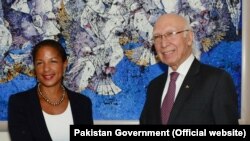U.S. National Security Adviser Susan Rice indicated on "a number of occasions" to leaders in Islamabad during her trip to Pakistan that they can do more to confront extremist groups, according to White House spokesman Josh Earnest.
Earnest said the first item on Rice’s agenda during her brief visit to Pakistan on Sunday was the security relationship between Pakistan and the United States. He said Rice told Pakistani officials there is more work the government can do to combat groups that pose a security threat to both Pakistan and the United States.
The spokesman said he is confident the subject also will be on the agenda when Pakistani Prime Minister Nawaz Sharif visits the White House later this year, adding that Rice passed on an invitation for him to visit Washington in late October.
Also Monday, Pakistan's foreign policy chief, Sartaj Aziz, responded to criticism by Rice that Pakistan is not doing enough to counter militants from the Haqqani Network.
He said the militants have been weakened by an army offensive and also disputed the U.S. assertion that the militants plan most of their Afghanistan attacks from Pakistani bases.
"Our assessment is that their capacity in Afghanistan is much, much bigger - probably 80 to 90 percent compared to what it is here. And what is here is also being cleaned out as a part of our operations," Aziz said.
According to a senior U.S. official, Rice told Pakistani leaders on Sunday that attacks in Afghanistan by forces based in Pakistan are "absolutely unacceptable."
The official said Rice warned Pakistani leaders that militant attacks in Afghanistan have become "a key point of regional friction" between the United States and Pakistan.
A senior Pakistani security official described the discussions between Rice and Pakistani officials as "frank and candid.”
“We told them that peace and stability in Afghanistan was the responsibility of all sides and stake holders,” the Pakistani official told VOA. “They talked about the Haqqani network and we shared our concerns.”
In their discussions with Rice, Pakistani officials insisted that Kabul is responsible for the lack of progress in peace and reconciliation with the Taliban, according to the Pakistani official.
Rice was in Pakistan at the invitation of the Pakistani government, as part of her trip to Asia. Contrary to reports in the local media, this trip was planned weeks ago and was not an “emergency visit” in response to rising tensions with its eastern neighbor India, State Department officials in Washington clarified.
